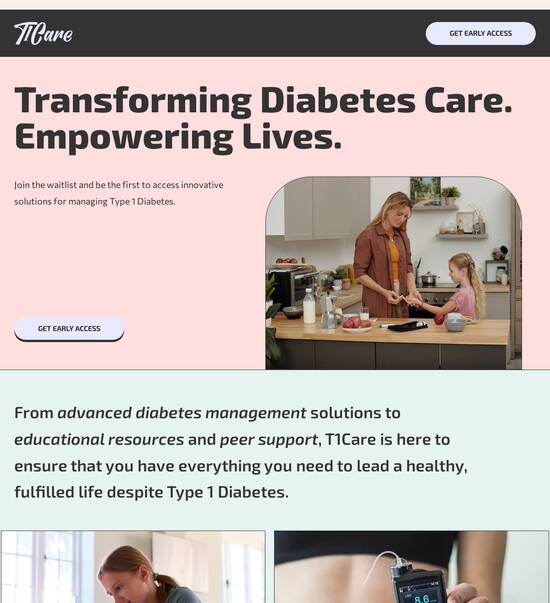
Minimal directory listing page template
Explore Similar TemplatesAbout template
Unleash your creativity with the minimal directory listing page template. Try Instapage today.
Recommended templates

Easy to build without coding
With the intuitive drag-and-drop builder, anyone on your team can create high-converting pages without any knowledge of code or design. Make enhancements to your landing page with custom widgets using Javascript, HTML/CSS, or third-party scripts.

Multiple layouts for any industry and goal
Select from 500+ landing page layouts built to boost conversions across industry-specific scenarios. Customize them by adjusting fonts, adding images, and generating on-brand content with the AI assistant. Quickly scale with Instablocks® and Global Blocks that you can save, reuse, and update globally.

Loads fast and looks polished on any device
Every template is responsive, which means they present professionally on any device and load blazingly fast with our Thor Render Engine. You can also power them up with Google AMP technology to deliver an unparalleled mobile experience and drive higher conversions.

Robust analytics & experimentation
Get real-time updates and reporting across all your devices, showing the number of visitors, conversions, cost-per-visitor, and cost-per-lead. Launch AI-powered experiments, run A/B tests, and use heatmaps to analyze user behavior, then optimize your landing page to maximize conversions.







Easy to build without coding
With the intuitive drag-and-drop builder, anyone on your team can create high-converting pages without any knowledge of code or design. Make enhancements to your landing page with custom widgets using Javascript, HTML/CSS, or third-party scripts.
Multiple layouts for any industry and goal
Select from 500+ landing page layouts built to boost conversions across industry-specific scenarios. Customize them by adjusting fonts, adding images, and generating on-brand content with the AI assistant. Quickly scale with Instablocks® and Global Blocks that you can save, reuse, and update globally.
Loads fast and looks polished on any device
Every template is responsive, which means they present professionally on any device and load blazingly fast with our Thor Render Engine.
Robust analytics & experimentation
Get real-time updates and reporting across all your devices, showing the number of visitors, conversions, cost-per-visitor, and cost-per-lead. Launch AI-powered experiments, run A/B tests, and use heatmaps to analyze user behavior, then optimize your landing page to maximize conversions.
All the features you need to build lead-generating landing pages
Explore more featuresLearn how to build top-performing landing pages for any goal
FAQs
Leading the way in building high-performing landing pages





Creating effective landing pages with Instapage
Launching successful marketing campaigns requires seamless execution and optimization, and that's where Instapage shines. With a powerful landing page and conversion rate optimization (CRO) platform, marketers can create high-converting pages that capture leads effectively. Instapage offers all the necessary tools for any budget or team size, ensuring that everyone can leverage its capabilities.
Understanding the power of templates and lead generation elements
Instapage provides access to over 100 ready-to-use, high-converting templates designed to accelerate your campaign efficiency. These templates are equipped with built-in lead generation elements that help you get started without reinventing the wheel. By utilizing intuitive builders and extensive libraries, you can swiftly launch landing pages that focus on conversion.
- Customizable templates allow you to tailor pages according to your brand identity.
- Pre-built lead generation elements facilitate capturing user information quickly.
- Intuitive design options mean you don't need coding skills to create stunning pages.
Steps to build a landing page with Instapage
Creating a landing page with Instapage is a straightforward three-step process.
- Choose and customize a template that matches your campaign goals, ensuring that you incorporate elements that resonate with your target audience.
- Utilize the drag-and-drop editor to add or modify content, images, and lead generation elements to fit the narrative of your marketing message.
- Once your page is built, use the analytics dashboard to gauge performance and make data-driven improvements.
Optimizing your landing page for conversions
Optimization is crucial in ensuring that your landing page performs at its peak. Monitoring results and making adjustments based on user behavior can drastically improve conversion rates.
- Implement A/B testing on different elements of your page to determine what works best for your audience.
- Analyze heatmaps to understand visitor interactions and identify potential improvements.
- Continuously assess performance metrics to refine your approach and enhance user engagement.
By following these steps, you ensure that your landing page not only looks great but also functions effectively for lead generation.
In conclusion, Instapage is your ultimate ally in creating, optimizing, and scaling landing pages that drive results. The combination of powerful tools and seamless user experience makes it an essential platform for marketers.
Ready to take your campaigns to the next level? Sign up for Instapage today and start building landing pages that convert.
People also ask about Minimal directory listing page template
Minimal directory listing page template: Designing for clarity and usability
Understanding minimal directory listing pages: An overview of their significance
Minimal directory listing pages serve as a streamlined interface for users to navigate a collection of resources or services. These pages eliminate clutter and focus on presenting information in a straightforward manner. The primary aim is to facilitate quick access to relevant content without overwhelming the user with unnecessary details.
Directory websites are vital in today’s online ecosystem. They allow consumers to find services, products, or information relevant to their needs effectively. The proliferation of such websites is indicative of increasing consumer reliance on the internet for local and global searches.
Emphasizing minimalism in design enhances user experience and engagement. A clean, concise interface enables users to focus on essential information, leading to quicker decisions and interactions. This approach caters to the modern user's preference for efficiency and simplicity in digital interactions.
Key features of a minimal directory listing page template
Understanding the essential features of a minimal directory listing template is crucial for effective design. Here are some of the key attributes that make such templates particularly effective in providing a user-friendly experience.
Sleek interface design: Clean aesthetics not only attract users but also assist in intuitive navigation. A visually appealing layout encourages users to explore further.
Optimized listings: Proper information hierarchy is vital for ease of understanding. The use of whitespace helps clarify listings, making it easier for users to find what they need.
Customizable elements: Templates should remain flexible to accommodate various business needs, allowing users to personalize their directory listings effectively.
HTML5 compatibility: Utilizing HTML5 can boost website performance, ensuring responsive design which guarantees functionality across devices.
SEO-friendly architecture: Building directory pages with SEO in mind enhances their visibility. Utilizing proper metadata aids in improving search engine rankings.
Essential elements of effective directory listing templates
An effective directory listing template comprises various essential elements that enhance functionality and user experience. These features ensure users can find and engage with listings efficiently.
Search functionality: Advanced filtering options combined with autocomplete suggestions streamline the search process, making it easier for users to find specific listings.
User ratings and reviews: Positive feedback boosts user confidence and encourages community engagement, fostering a loyal userbase and improving overall trust in the directory.
Interactive maps integration: Embedding maps helps users visualize listings’ locations, improving navigation and overall user satisfaction.
Clear call-to-action buttons: Direct and strategically placed CTAs inspire users to take desired actions, ultimately increasing conversion rates.
Mobile optimization: As more users access websites via mobile devices, ensuring responsiveness enhances user experience. Considerations for touch navigation are essential.
Distinctive offerings of popular template packages
Various template packages stand out due to their unique offerings and capabilities. By examining popular templates, users can identify features that best meet their needs for a minimal directory listing website.
Listify template: Known for its user-friendly layout and robust features, Listify excels at providing all necessary functionalities for a fully operational directory website.
Comparative analysis with other directory website templates: Identifying competitors in the market reveals performance metrics and user experiences that guide template selection.
WordPress integration benefits: With a vast plugin ecosystem, WordPress easily enhances directory features. Case studies showcase successful implementations using WordPress as a directory platform.
Tailoring directory websites to target audience needs
To develop a successful directory website, understanding and catering to the target audience is paramount. Effective implementation involves several strategies that focus on user needs.
Understanding user demographics: Conducting user research helps identify audience preferences and needs, allowing for better-targeted content.
Dynamic listings management: Allowing user-contributed listings not only increases content volume but also keeps listings relevant through automated updates.
Streamlining onboarding processes: A smooth registration and listing submission process enhances user satisfaction while ensuring compliance and security.
Best practices for implementing minimal directory listing page templates
Adopting best practices during the implementation of minimal directory listing templates can drastically improve the success of the directory. Identifying the right approaches can lead to enhanced user interaction.
Choosing the right template: Consider factors like design preferences, target audience, and functionality needs. A cost versus benefit analysis of different packages can ensure optimal selection.
Content strategy for engagement: Curate compelling listings while incorporating multimedia elements to enhance visibility and user interest.
Continuous optimization and A/B testing: Regularly testing user preferences allows for data-driven decisions that lead to ongoing performance improvements.
The future of directory websites: Trends and innovations
The landscape of directory websites continues to evolve, driven by advancements in technology and changing user expectations. Emerging trends promise to greatly influence the future implementations of directory listings.
Emerging technologies shaping directory websites: The integration of AI and machine learning aids in content curation, while voice search functionalities significantly alter how users navigate.
Sustainability and ethical considerations: As businesses prioritize responsible data handling, showcasing local listings aids community connections and sustainable practices.
Expanding functionality through integrations: Incorporating eCommerce capabilities broaden directory offerings, while synergizing with social media maximizes audience reach.
User-centric case studies: Success stories of directory websites
Illustrating the real-world applications of minimal directory listing page templates, case studies reveal effective strategies and outcomes in various sectors.
Analysis of successful listings in various niches: Investigating travel directories and business listings uncovers effective practices that enhance visibility and engagement.
Feedback from users on minimal directory design: Users often report transformative experiences due to improved usability and streamlined access to information.
Lessons learned from failed implementations: Identifying common pitfalls, such as oversimplification or technical challenges, helps developers implement more robust solutions.
Overview of directory listings' actual needs and challenges
Understanding the real needs of directory listings is essential for crafting effective templates. Addressing challenges ensures user satisfaction and enhances overall performance.
Finding the right balance between minimalism and functionality: Oversimplification can result in incomplete listings, underscoring the need for comprehensive yet concise designs.
Addressing technical challenges in implementation: Common hurdles often arise during the development of directory websites. Recognizing these obstacles can facilitate smoother project execution.
Adapting to changing user expectations: Monitoring trends in user preferences enables creators to pivot and revise content and design strategies accordingly.
Ready to skyrocket conversions?
Supercharge your ad campaigns with high-performing landing pages
Get started














